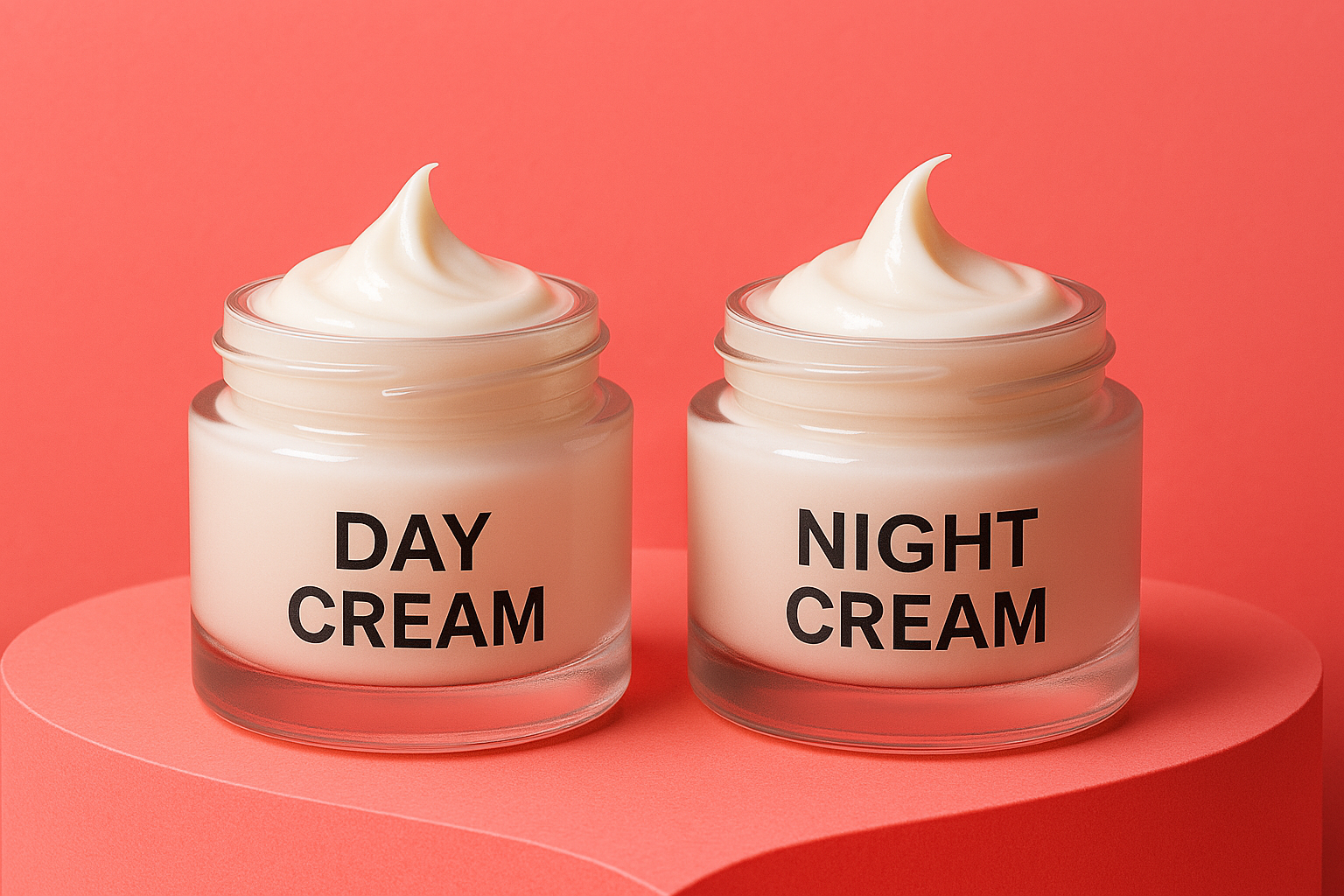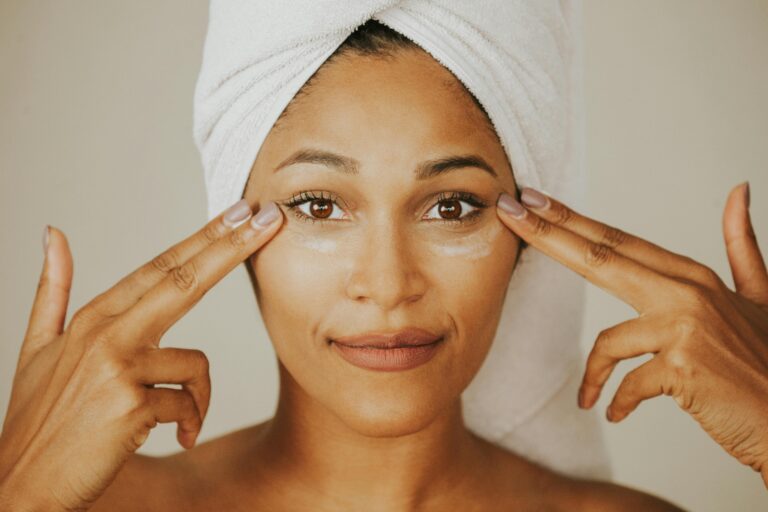If you’ve ever browsed the skincare aisle or read a beauty blog, you’ve probably noticed products labeled specifically as “day creams” and “night creams.” At first glance, this might seem like a clever marketing ploy—why would your skin need a different cream depending on the time of day? Isn’t moisture just moisture?
The truth is, our skin goes through different processes during the day and night. Skincare companies design products to support these cycles, but does that mean you need two separate products to do the job?
In this article, we’ll break down what day and night creams are, how they differ, the unique benefits they offer, and whether investing in both is actually worth it. Whether you’re a skincare minimalist or a product enthusiast, this guide will help you make an informed decision for your routine.
Understanding the Basics
Before deciding if you need both a day and a night cream, it’s important to understand what each one is designed to do. While both are moisturizers at their core, their formulations are tailored to support your skin’s natural rhythms.
What Is a Day Cream?
Day creams are formulated to protect and hydrate your skin while you’re out and about. They often contain ingredients that shield against environmental stressors like UV rays, pollution, and blue light.
Key Characteristics:
- Lightweight texture for comfort under makeup.
- Fast-absorbing formulas to avoid greasiness.
- Often include SPF to protect from sun damage.
- May feature antioxidants like Vitamin C or niacinamide to fight free radicals.
Primary Purpose:
Protection + hydration to keep skin looking fresh and resilient during the day.
What Is a Night Cream?
Night creams are built to support your skin’s repair process, which ramps up while you sleep. During this time, your skin isn’t defending itself from the sun or pollution—it’s regenerating and recovering.
Key Characteristics:
- Richer, more emollient textures to deeply moisturize.
- Contain active ingredients like retinol, peptides, or AHAs.
- Designed to nourish, repair, and boost cell turnover.
Primary Purpose:
Recovery + rejuvenation to help your skin heal and wake up glowing.
Day and night creams are like teammates working different shifts. One protects, the other restores.
Key Differences: Day vs. Night Creams
Although day and night creams may look similar in the jar, their roles in your skincare routine are quite distinct. Each is formulated with different goals, textures, and ingredients in mind.
Here’s a breakdown of how they stack up:
| Feature | Day Cream | Night Cream |
|---|---|---|
| Main Function | Protection from UV rays, pollution, and daily stress | Repair and restore skin overnight |
| Texture | Lightweight, non-greasy | Rich, thick, deeply moisturizing |
| Key Ingredients | SPF, Vitamin C, niacinamide, antioxidants | Retinol, peptides, hyaluronic acid, ceramides |
| Absorption Needs | Fast-absorbing for layering under makeup | Slow-release to work overnight |
| Target Concerns | Environmental damage, dullness | Aging signs, dryness, skin renewal |
| Time of Use | Morning (AM routine) | Evening (PM routine) |
Why the Difference Matters
Your skin behaves differently during the day and at night:
- Daytime: Your skin needs defense mechanisms against external aggressors.
- Nighttime: Your skin switches into “repair mode,” working to rebuild collagen, heal micro-damage, and absorb nutrients.
Using the right product at the right time can maximize your skin’s natural processes and deliver better results over time.
Benefits of Using Each
Using both a day and night cream isn’t just about following beauty trends—it’s about giving your skin what it needs when it needs it. Each type of cream is packed with ingredients tailored to work with your skin’s daily rhythm.
Benefits of Day Creams
- Protection Against UV and Pollution
Many day creams include SPF and antioxidants, which help shield your skin from sun damage and environmental pollutants that can lead to premature aging. - Hydration Without Heaviness
Formulated to be lightweight and fast-absorbing, day creams provide hydration without interfering with makeup or making your skin feel greasy. - Brightening and Tone-Evening Effects
Ingredients like Vitamin C and niacinamide can help fade dark spots, boost radiance, and even out your skin tone during the day. - Prevents Moisture Loss
Helps maintain your skin’s moisture barrier throughout the day, especially in dry or air-conditioned environments.
Benefits of Night Creams
- Deep Hydration While You Sleep
Night creams tend to be richer, providing intense moisture that soaks in slowly and nourishes the skin over several hours. - Supports Skin Regeneration
With active ingredients like retinol, peptides, and AHAs, night creams help promote cell turnover and repair skin from daily damage. - Targets Aging Signs
These creams often focus on anti-aging, working on fine lines, wrinkles, and firmness while your skin is in its natural renewal mode. - Boosts Collagen Production
Ingredients like retinoids and peptides stimulate collagen synthesis, helping to maintain skin elasticity and smoothness over time.
Bottom line: Day creams help protect your skin; night creams help correct it.
Do You Really Need Both?
The Short Answer: It depends on your skin’s needs, your lifestyle, and how targeted you want your skincare routine to be.
When You Might Need Both:
✅ You have specific skincare goals
If you’re targeting fine lines, uneven skin tone, or dullness, using both creams lets you treat your skin around the clock with specialized ingredients.
✅ You spend time outdoors or in urban environments
Day creams with SPF and antioxidants help defend against sun damage and pollution, while night creams help repair that damage.
✅ Your skin changes throughout the day
For many people, skin tends to get oilier during the day and drier at night. Using creams that suit these fluctuations can make a big difference in comfort and appearance.
✅ You’re over 30 (or noticing signs of aging)
As collagen production slows down, using a nourishing night cream can support your skin’s regeneration process.
When You Might Be Fine With Just One:
🟡 You have very simple skincare needs
If your skin is healthy, young, and not particularly dry or acne-prone, a lightweight moisturizer (with SPF in the morning) might be enough.
🟡 You’re on a budget
Instead of buying two separate products, look for a multitasking moisturizer that can hydrate and protect during the day, and gently support your skin at night.
🟡 You’re new to skincare
Start simple! A gentle cleanser + one solid moisturizer (and SPF!) is a great entry point. You can always upgrade your routine later.
A Balanced Take:
Having separate day and night creams isn’t strictly essential, but it’s often beneficial. Think of it like wearing different shoes for the gym and a fancy dinner—they both serve a purpose and make things a bit better, even if one pair could technically do it all.
Expert Opinions
Dermatologists and skincare specialists generally agree: while using both a day and night cream isn’t absolutely necessary for everyone, it can significantly improve your skin’s health and appearance—especially if you’re addressing specific concerns like aging, dryness, or sun damage.
What Dermatologists Say
🗨️ “Skin has different needs during the day and at night. During the day, it needs protection from UV and pollution. At night, it benefits from ingredients that stimulate repair and regeneration.”
— Dr. Marisa Garshick, Board-Certified Dermatologist
🗨️ “Nighttime is the best time to use actives like retinoids or glycolic acid, since your skin is in recovery mode and you don’t have to worry about sun sensitivity.”
— Dr. Shereene Idriss, Cosmetic Dermatologist
What Estheticians Recommend
💬 “Think of your day cream as your shield, and your night cream as your therapy. Together, they help keep your skin balanced and healthy.”
— Joanna Vargas, Celebrity Esthetician
💬 “Using both is like giving your skin a full 24-hour care cycle. You’re covering all bases—hydration, protection, and repair.”
— Renée Rouleau, Skin Care Expert
Science Supports the Difference
Research on skin circadian rhythms shows that:
- Daytime: Skin produces more sebum (oil) and is better at protecting itself.
- Nighttime: Skin has increased blood flow and cell turnover, making it more receptive to treatments.
This aligns with the purpose of day creams (defensive) and night creams (restorative).
Bottom line from the pros? You don’t have to use both—but doing so can help you level up your skincare game if you’re looking for maximum results.
Tips for Choosing the Right Creams
With so many products on the market, choosing the right day and night creams can feel overwhelming. But it doesn’t have to be. The key is to focus on your skin’s needs, read labels carefully, and avoid unnecessary extras.
1. Know Your Skin Type
🟦 Dry Skin
Look for creams with hyaluronic acid, ceramides, and shea butter. Go for richer textures, especially in night creams.
🟨 Oily or Acne-Prone Skin
Choose oil-free, non-comedogenic formulas. Light gel-cream textures work well, and ingredients like niacinamide or salicylic acid can help control breakouts.
🟩 Combination Skin
Use a balancing day cream and a slightly richer night cream. Gel moisturizers for the T-zone and creamier products for dry areas work great.
🟥 Sensitive Skin
Opt for fragrance-free, hypoallergenic products. Ingredients like aloe, chamomile, and colloidal oatmeal are soothing and gentle.
2. Scan the Ingredient List
- For day creams, look for:
- SPF 30+
- Vitamin C
- Antioxidants (like green tea extract or ferulic acid)
- Lightweight hydrators like glycerin
- For night creams, seek out:
- Retinol (for anti-aging and acne)
- Peptides (to support collagen)
- AHAs/BHAs (for exfoliation)
- Deep moisturizers like squalane or plant oils
3. Consider Your Lifestyle
- Always in a rush? Look for multi-use products (e.g., a tinted day cream with SPF).
- Minimalist? A gentle, hydrating cream used day and night might be enough—just don’t forget SPF in the morning.
- Skincare lover? Layer serums under your day/night creams for a targeted boost.
4. Patch Test New Products
Even if a cream sounds perfect on paper, always patch test new formulas to avoid irritation or breakouts—especially when using actives like retinol or exfoliating acids.
5. Don’t Be Fooled by Price Tags
Expensive doesn’t always mean better. Many drugstore brands offer excellent day and night creams with proven ingredients. Look for quality over hype.
Pro tip: Your skin changes with the seasons, age, and hormones—so your creams might need to change, too.
Conclusion
So—do you really need both a day cream and a night cream?
Not necessarily, but using both can seriously elevate your skincare routine. These products are designed with different purposes in mind: day creams protect, while night creams repair. If you’re looking to defend your skin from environmental stress during the day and support its natural regeneration at night, using both can be a smart move.
That said, skincare isn’t one-size-fits-all. Some people thrive with a simple, streamlined routine using one solid moisturizer and SPF, while others prefer a full lineup of targeted treatments.
The bottom line? Listen to your skin. If you notice that one product isn’t enough—or that your skin feels dry in the morning or tight at night—it might be time to upgrade to a more tailored approach.
Whether you’re a skincare minimalist or a product junkie, understanding what your skin needs throughout the day and night is the real secret to a healthy, glowing complexion.




